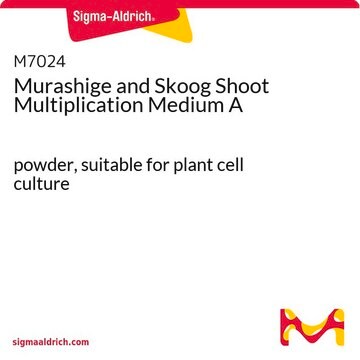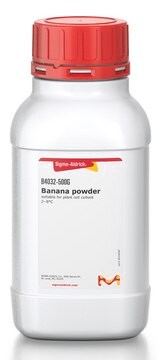M0404
Murashige and Skoog Basal Medium
powder, suitable for plant cell culture, with Gamborg′s vitamins
Synonym(s):
MS0 Medium, MSO Medium, Murashige and Skoog (Gamborg Modified) Basal Media, MS Basal Medium
About This Item
Recommended Products
Quality Level
form
powder
technique(s)
cell culture | plant: suitable
application(s)
agriculture
shipped in
ambient
storage temp.
2-8°C
Looking for similar products? Visit Product Comparison Guide
Application
- to germinate the seeds for seedling growth and germination studies
- in the suspension culture of Nicotiana plumbaginifolia for transformation
- in the root culture of hairy clone A. artemisiifolia T4
Formula variant
Media Formulation
Quantity
Preparation Note
Murashige and Skoog medium (M0404) contains the macro- and micronutrients of M&S basal medium as described by Gamborg, et al (1968). It can be supplemented with organics and with auxins (IAA) and cytokinins (Kinetin) to generate a complete medium for growth plant tissue culture.
Signal Word
Warning
Hazard Statements
Precautionary Statements
Hazard Classifications
Eye Irrit. 2 - Ox. Sol. 3
Storage Class Code
5.1B - Oxidizing hazardous materials
WGK
WGK 2
Flash Point(F)
Not applicable
Flash Point(C)
Not applicable
Certificates of Analysis (COA)
Search for Certificates of Analysis (COA) by entering the products Lot/Batch Number. Lot and Batch Numbers can be found on a product’s label following the words ‘Lot’ or ‘Batch’.
Already Own This Product?
Find documentation for the products that you have recently purchased in the Document Library.
Customers Also Viewed
Our team of scientists has experience in all areas of research including Life Science, Material Science, Chemical Synthesis, Chromatography, Analytical and many others.
Contact Technical Service












